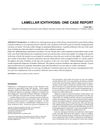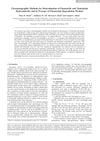 August 2024 in “Applied Sciences”
August 2024 in “Applied Sciences” Plant extracts may help prevent or reverse hair graying.
 August 2024 in “Drug Design Development and Therapy”
August 2024 in “Drug Design Development and Therapy” Decursin shows promise for treating cancer, neuroprotection, inflammation, and hair loss.
[object Object]  May 2024 in “International Journal of Nanomedicine”
May 2024 in “International Journal of Nanomedicine” Biodegradable polymers can improve cannabinoid delivery but need more clinical trials.
April 2024 in “Molecules/Molecules online/Molecules annual” Paris polyphylla saponins may effectively treat acne due to their antibacterial and anti-inflammatory properties.

Ganoderma lucidum extract may help treat stress-related hair loss.
February 2024 in “IntechOpen eBooks” Proper nutrition can help manage PCOS symptoms and improve overall health.
 January 2024 in “Biology of sex differences”
January 2024 in “Biology of sex differences” Dihydrotestosterone makes arteries stiffer in female mice by reducing estrogen receptor expression.

Nanocarriers with plant extracts show promise for safe and effective hair growth treatment.
 October 2023 in “Cell & bioscience”
October 2023 in “Cell & bioscience” A special gene region controls the re-emergence of a primitive wool type in Merino sheep, improving their wool yield and adaptability.
 July 2023 in “Frontiers in Veterinary Science”
July 2023 in “Frontiers in Veterinary Science” Melatonin helps hair grow by activating the RORα receptor in goats.
 July 2021 in “IntechOpen eBooks”
July 2021 in “IntechOpen eBooks” Ginseng, especially its component ginsenosides, can promote hair growth, reduce hair loss, and potentially treat conditions like alopecia by affecting cell pathways and cytokines.
Natural products may help treat hair loss by promoting hair growth with fewer side effects.
January 2020 in “Brazilian Journal of Pharmaceutical Sciences” Finasteride worsens heart damage from nandrolone decanoate but protects against cell damage.
 14 citations,
April 2019 in “Saudi pharmaceutical journal”
14 citations,
April 2019 in “Saudi pharmaceutical journal” Microparticles help caffeic acid stay longer in hair follicles for better treatment of folliculitis.
 1 citations,
January 2019 in “International Journal of Medical Reviews and Case Reports”
1 citations,
January 2019 in “International Journal of Medical Reviews and Case Reports” Treatment with moisturizers improved the skin condition of a girl with a rare genetic skin disorder.
 27 citations,
January 2017 in “Neuropsychopharmacology”
27 citations,
January 2017 in “Neuropsychopharmacology” The enzyme 5α-reductase is key in causing psychotic-like effects from sleep deprivation.
 January 2002 in “Journal of Toxicology-cutaneous and Ocular Toxicology”
January 2002 in “Journal of Toxicology-cutaneous and Ocular Toxicology” Botanical extracts are increasingly important in cosmetics and drugs for their effectiveness and safety, backed by traditional use and scientific evidence.
[object Object]  April 2018 in “Journal of Chromatographic Science”
April 2018 in “Journal of Chromatographic Science” Finasteride's stability and safety confirmed through precise analytical methods.
13 citations,
May 2021 in “FASEB bioAdvances” Plant-based products can improve hair and skin health without harmful side effects.
 February 2024 in “Trends in Sciences”
February 2024 in “Trends in Sciences” Store Tectona grandis leaf extracts in slightly acidic, light-protected conditions for best stability.
 8 citations,
February 2022 in “Molecules”
8 citations,
February 2022 in “Molecules” Asparagus racemosus root extract reduced sebum and pore size in men but not in women.
 79 citations,
January 2018 in “Wiley Interdisciplinary Reviews-Developmental Biology”
79 citations,
January 2018 in “Wiley Interdisciplinary Reviews-Developmental Biology” Understanding how baby skin heals without scars could help develop treatments for adults to heal wounds without leaving scars.
 26 citations,
April 2019 in “Advances in wound care”
26 citations,
April 2019 in “Advances in wound care” Tannic acid helps wounds heal faster in rats by activating certain cell signals and reducing inflammation.
 22 citations,
January 2001 in “Chemical & Pharmaceutical Bulletin”
22 citations,
January 2001 in “Chemical & Pharmaceutical Bulletin” Some new progesterone derivatives are better at blocking testosterone conversion than a common drug.
 September 2017 in “Journal of Investigative Dermatology”
September 2017 in “Journal of Investigative Dermatology” Mackerel fermented fish oil protects skin cells from damage by UVB light.
 34 citations,
August 2002 in “British Journal of Dermatology”
34 citations,
August 2002 in “British Journal of Dermatology” ALA-PDT is effective and safe for chronic X-ray dermatitis, providing complete or partial remission.
 52 citations,
September 2018 in “International Journal of Molecular Sciences”
52 citations,
September 2018 in “International Journal of Molecular Sciences” Ginseng and its compounds may help hair growth and prevent hair loss, but more human trials are needed to confirm this.
 33 citations,
September 2017 in “Molecules”
33 citations,
September 2017 in “Molecules” Red ginseng oil and its components help promote hair regrowth and could treat hair loss.
 15 citations,
February 2015 in “Han-gug chugsan sigpum hag-hoeji/Korean journal for food science of animal resources”
15 citations,
February 2015 in “Han-gug chugsan sigpum hag-hoeji/Korean journal for food science of animal resources” Egg shell membrane hydrolysates can reduce wrinkles and improve skin health.
 4 citations,
March 2019 in “Acta Chromatographica”
4 citations,
March 2019 in “Acta Chromatographica” Two methods can measure finasteride and tamsulosin hydrochloride; HPLC is more advantageous, while TLC offers better separation.

























